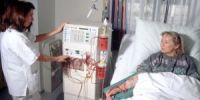Article
Patients Undergoing Dialysis Found to Have Atrial Fibrillation
Author(s):
A new study of atrial fibrillation patients who require regular dialysis found more episodes of irregular heartbeat on dialysis days - particularly when dialysis was actually taking place - than at other times.

A new study of atrial fibrillation (AF) patients who require regular dialysis found more episodes of irregular heartbeat on dialysis days — particularly when dialysis was actually taking place — than at other times.
Researchers from several hospitals in the Netherlands monitored 40 dialysis patients enrolled in the implantable cardioverter defibrillator-2 (ICD-2) trial — noting the exact time of each AF episode and then comparing it to dialysis schedules.
During a follow-up period that averaged 28 months, the ICD-2s detected a total of 428 AF episodes in 14 patients. Subsequent analysis found AF onset was more frequent on the days of hemodialysis (HD) (p<0.001), specifically during the dialysis procedure itself (p=0.04).
The researchers also reported that the AF patients they studied— who were 80% male and, on average, 70 years old — had larger left atria (p<0.001) and higher systolic blood pressure before and after HD (p<0.001).
“This study provides insight in the exact timing of AF onset in relation to the dialysis procedure itself,” wrote the authors, who published their work in the journal Heart. “These findings might help to elucidate some aspects of the pathophysiology of AF in dialysis patients and could facilitate early detection of AF in these high-risk patients.”
Dialysis users with AF face serious mortality threats. Analyses vary, but most put the annual risk of death for such patients around 40%.
Worse, another recent study of AF patients who require dialysis suggests that treatment may not help them as much as other AF patients.
That study, which Canadian researchers published in Circulation earlier this year, concluded that warfarin use was not associated with a lower risk for stroke (HR: 1.14, 95% confidence interval [CI]: 0.78-1.67) but was associated with a 44% higher risk for bleeding (HR: 1.44, 95% CI: 1.13-1.85). Propensity score adjusted analyses yielded similar results.
Such findings affect a very large number of people.
Patients who begin HD are far more likely to develop AF than otherwise comparable people who do not need dialysis.
Indeed, a 2012 study of 250,000 senior patients who started dialysis between 1995 and 2007 found that 29% of them developed AF before they either died or received kidney transplants.
And the likelihood that a new dialysis patient will develop AF seems to be growing worse.
The 250,000-patient study, which was also published in Circulation, found that the chance of AF onset in the first year after beginning dialysis rose from 11% in 1995 to 15% in 2007.
The overall rate of AF among patients on dialysis rose during a similar time frame from 3.5% to 10.7%, according to a 2011 study published in the Journal of the American Society of Nephrology.
Several factors may contribute to the link between dialysis and AF. For example, poor kidney function, which creates the need for HD, is also an independent risk factor for AF.
As for the increasing chances that new dialysis patients will develop AF — that may be a function of age. The average age of patients starting dialysis has risen sharply, and the percentage who are over 65 has grown over the past 3 decades from a quarter to a half.





